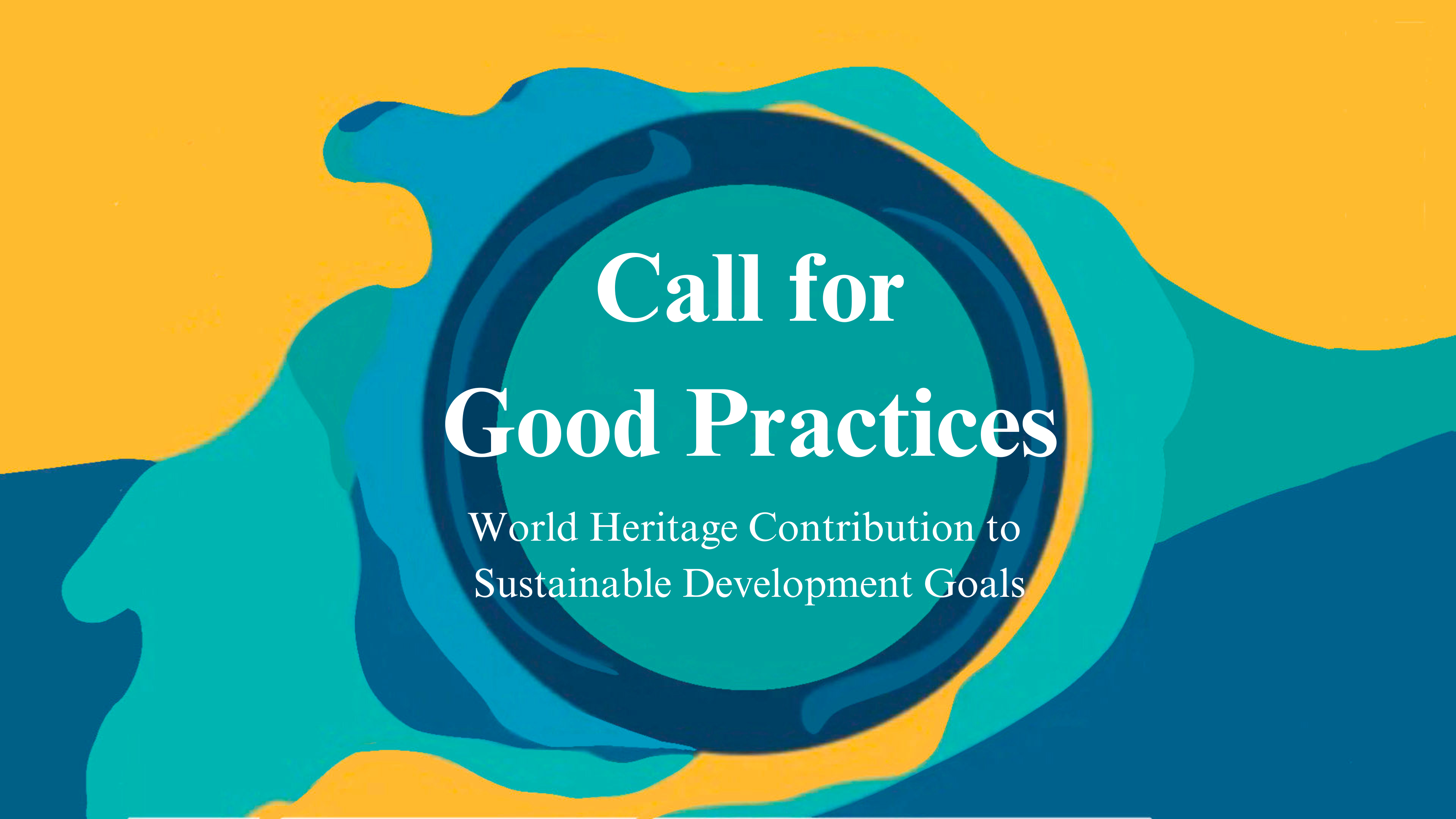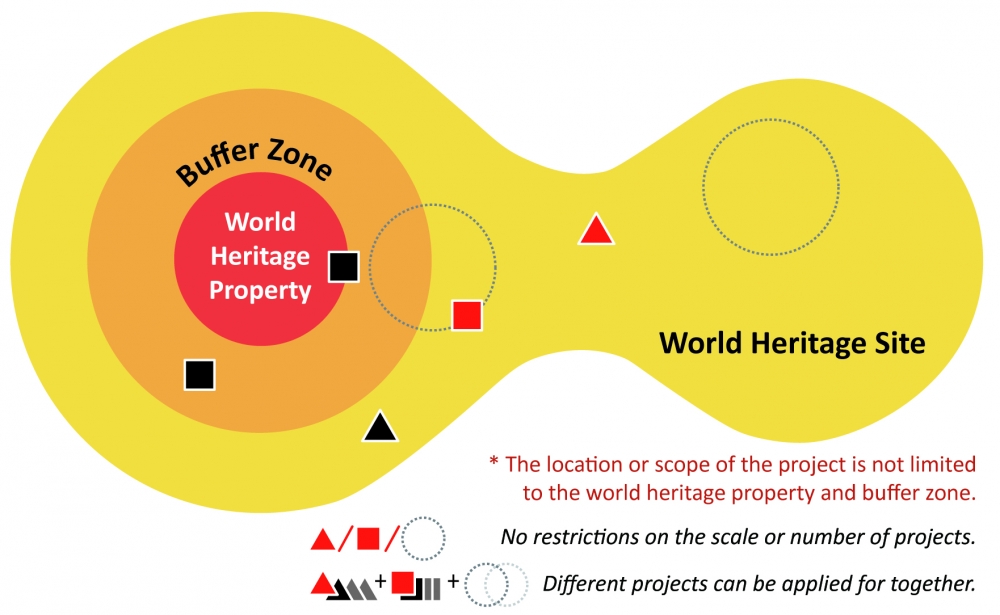
Submission deadline: 31 March 2025
Since 2023, WHITR-AP Shanghai has launched the HeritAP Initiative on World Heritage Contribution to Sustainable Development Goals. Now, it is calling for Good Practices from heritage practitioners on how heritage conservation and management contribute to sustainable development.The Heritage Asia-Pacific (heritAP) is a network of heritage practitioners supported by WHITR-AP Shanghai. It aims to foster the sharing of knowledge and experiences among individuals and institutions in the Asia-Pacific Region by establishing diverse links between individuals, groups and institutions, adhering to the philosophy that true knowledge springs from practice.
Backgrounds
The United Nations Sustainable Development Goals (SDGs) are the core guidelines for global development efforts from 2015 to 2030. In 2015, the Policy on the Integration of a Sustainable Development Perspective into the Process of the World Heritage Convention was formulated to guide the conservation and management of World Heritage. The "Regional Framework Action Plan for Asia and the Pacific (2023 - 2030)" takes good sustainable development cases as one of the performance indicators.
In 2023, encouraged by UNESCO, WHITR - AP Shanghai launched the "World Heritage Contribution to Sustainable Development Goals" project (2023 - 2028) in the Asia - Pacific region. An steering group was established with representatives from UNESCO World Heritage Centre, World Heritage advisory bodies, the Southeast Asian Ministers of Education Organization Regional Centre for Archaeology and Fine Arts (SEAMEO SPAFA), the International Centre on Space Technologies for Natural and Cultural Heritage (HIST) etc., to collect good cases in the Asia - Pacific region.
The overall goals of the project are as follows:
- Facilitate all parties' in-depth understanding of international sustainable development documents.
- Explore and recognize the contributions of heritage practitioners in conservation and management work.
- Interpret and analyze effective ways to achieve sustainable development in the practice of heritage conservation and management for heritage practitioners.
Prosperity and Livelihoods (2025)
When exploring the "Contribution of World Heritage to Sustainable Development Goals," based on the Heritage Place Approach, it is necessary to comprehensively examine the sustainable development issues of heritage sites. The Steering group of WHITR-AP Shanghai will start from an overall perspective and conduct an in - depth analysis of good cases. It will interpret the strategic relationships between projects and heritage sites in the five dimensions of culture, economy, society, environment, and governance, and analyze the ways and paths by which these projects influence and promote the sustainable development of heritage sites.
The theme for the 2025 call for cases is "Prosperity and Livelihoods". The cases for application can include, but are not limited to, the following aspects:
1.A good balance between economic development and heritage protection: Committed to promoting the coordinated development of economic development and heritage protection, through in - depth exploration of regional culture, characteristic tourism products are developed, and cultural and creative industries or other industries are fostered. While achieving significant economic growth, it ensures that the core values of heritage sites are not compromised. Through this development model, a large number of job opportunities are created in the fields of cultural tourism, heritage protection, and related service industries. This effectively raises the income level of residents, comprehensively improves the quality of life of residents, and promotes the prosperity and stable development of the community economy.
2.Strong innovation and promotion of sustainable livelihood models: Actively explore and construct sustainable livelihood models such as in agriculture and handicrafts, promoting the diversified development of the local economy. With the help of policy support and technical training, small and micro - enterprises are assisted to enhance their market competitiveness, optimize the economic structure, and strengthen the resilience of the local economy. The coordinated development of multiple industries promotes the steady progress of the local economy.
Target Audience
This call is open to all heritage practitioners directly involved in heritage conservation and management. The applicants can be individuals, organizations, or a combination of individuals and organizations.

For the Tentative List, click here:https://whc.unesco.org/en/tentativelists/?action=listtentative&order=states
The location or scope of the projects is not limited to the World Heritage property or buffer zone.

Benefits of Participation
By participating in this Call for Good Practices, applicants will reap the following benefits:
(1) Authoritative Affirmation and Value Highlighting
The heritage conservation and management efforts will receive official recognition on an international scale. Certificates will be granted by WHITR-AP Shanghai, a UNESCO Category 2 Center. This serves as both an acknowledgment of past endeavors and a powerful impetus for future initiatives. Moreover, outstanding cases will be forwarded to the UNESCO World Heritage Centre. This will enable heritage sites to stand out in the international heritage conservation arena, draw widespread attention, and further underscore their intrinsic value.
(2) Exchange and Mutual Learning to Optimize Development Paths
It offers a unique opportunity to engage in communication and exchange with UNESCO heritage conservation experts and other outstanding practitioners internationally. Participants can share the sustainable development approaches of their respective heritage sites and jointly explore optimization strategies. In the process of exchanging ideas, the local concepts of how World Heritage contributes to sustainable development can be further enriched. Particularly for the heritage site hosting the annual conference, it can directly obtain suggestions from domestic and international experts regarding its own sustainable development path. It can also collaborate with experts in planning the annual conference activities, thereby injecting new vitality into the development of the heritage site.
(3) Amplifying Influence and Enhancing Recognition
By leveraging international professional platforms such as the World Heritage Convention (WHC), the International Centre for the Study of the Preservation and Restoration of Cultural Property (ICCROM), the International Council on Monuments and Sites (ICOMOS), and the WHITR-AP, the heritage site will be actively promoted and publicized. Project leaders will also be invited to attend the HeritAP annual meeting. This provides an opportunity to showcase the achievements of the project, gradually expand its influence, and enable more heritage practitioners to understand the unique charm and effective protection of the heritage site.
Schedule of the year
March 31: Submission deadline;
April 30: Preliminary review;
May: Online presentation of preliminary selected cases at HeritAP Chat;
June - July: Enrichment of case information, field study to the annual meeting host;
August - September: Annual meeting preparation;
October - November: Annual meeting held, announcement of good practices;
November - March of the following year: Call for the next round of good practices.


How to Apply
Please complete the application form and send it heritap@whitr-ap.org.
The following are some notes to facilitate your application:
1.Each project should be submitted on a separate application form.
2.A heritage site may apply for one or multiple projects, and the intrinsic relationship of sustainable development among multiple projects should be stated in the application.
3.One or multiple projects can meet the requirements of one or more themes (“Environment and Resilience”, “Prosperity and Livelihoods”, “Knowledge and Skills”, “Inclusion and Participation”). The 2025 call is for “Prosperity and Livelihoods” cases.
 申请表 中文版
申请表 中文版
Contacts
If you have any questions, please contact:
Ms. LI Hong, Project Director, WHITR-AP Shanghai
Email: HeritAP@whitr-ap.org
Tel: +86 21 65987687 ext. 8010







